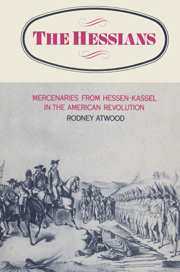Book contents
- Frontmatter
- Contents
- List of maps
- Acknowledgements
- Abbreviations
- Note on German ranks and currency
- Introduction
- 1 The German soldier trade
- 2 The Hessians go to America
- 3 The victories of 1776
- 4 The Battle of Trenton
- 5 The campaigns of 1777–81
- 6 Anglo-Hessian relations
- 7 The Hessian view of the American Revolution
- 8 Hessian plundering
- 9 Hessian desertion
- 10 Recruiting in Germany
- 11 The impact of the war on Hessen
- 12 Conclusion
- Appendices
- Bibliography
- Index
- Frontmatter
- Contents
- List of maps
- Acknowledgements
- Abbreviations
- Note on German ranks and currency
- Introduction
- 1 The German soldier trade
- 2 The Hessians go to America
- 3 The victories of 1776
- 4 The Battle of Trenton
- 5 The campaigns of 1777–81
- 6 Anglo-Hessian relations
- 7 The Hessian view of the American Revolution
- 8 Hessian plundering
- 9 Hessian desertion
- 10 Recruiting in Germany
- 11 The impact of the war on Hessen
- 12 Conclusion
- Appendices
- Bibliography
- Index
Summary
The hiring of auxiliary troops by great powers in the eighteenth century marks a transitional stage in the history of western warfare, from the feudal levy to the modern conscript army. Auxiliary contingents then served in the armies of all great powers (except Russia) in the wars of that century. International jurists of the time, attempting to draw limits to destructive warfare by applying Natural Law to human affairs, recognized the practice of one prince sending aid to another at war, in the form of troops, in exchange for moneys called subsidies. They distinguished between such troops, called auxiliaries (Hilfstruppen), and mercenaries, who were individuals who enlisted in foreign military service in return for a certain sum of money and certain conditions, such as a limit on the length of their service.
The study of the Hessen-Kassel corps enables us to see one of these auxiliary contingents in detail: its personnel, training, discipline, recruiting practices, organization, and the difficulty of its working as part of a foreign (British) army composed of men speaking a different language and with different political traditions.
Both the Hessian corps and the British army included within their ranks mercenaries, i.e. foreigners who had enlisted for pay, but properly neither of them could be called mercenary.
The Hessians are particularly interesting, not merely because their princes were the most successful, and later infamous, at hiring out auxiliaries; but also because they confronted in America a new society and new ideals of liberalism and patriotism which were to make the hiring of troops for pay anachronistic.
- Type
- Chapter
- Information
- The Hessians , pp. 1 - 6Publisher: Cambridge University PressPrint publication year: 1980

